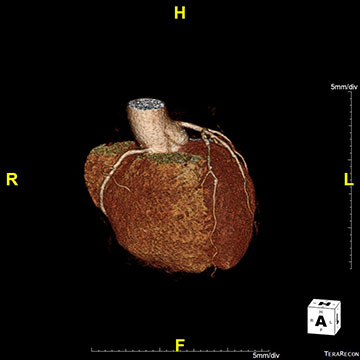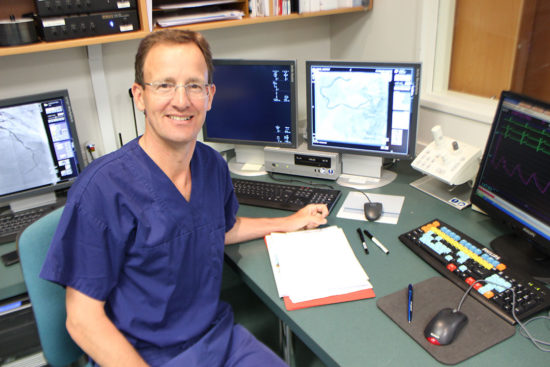Chest Pain?
We can help. At Cardiology Specialists, we can help work out whether your chest pain is from the heart.
Causes
There are different causes for chest pain but heart pain may not present in a typical way.
The heart muscle needs a supply of oxygen and energy that has to increase or decrease depending on the heart muscle demand.
Narrowed arteries are unable to keep up with the demand needed to supply the heart muscle
Symptoms
The most common symptom of this problem is chest pain that occurs when you exert yourself (angina). Typical angina chest pain is a heavy sensation in your chest associated with shortness of breath. It sometimes radiates to your arms, jaw, or between shoulder blades, and can make you feel like being sick, dizzy or sweaty. Some patients state that it is not a pain but instead a ‘tightness’ or ‘weight on the chest’ and/or down inside of arm. Some people describe heart pain as “burning” but different to their indigestion.
Heart pain can wake a patient at night, or occur after meals.
Other people just “slow down” or are short of breath. Not everybody experiences the same sensation and any one of those symptoms can represent angina.
Heart Attack (Myocardial Infarction)
If an attack of angina lasts for more than 20 minutes then you may be having a heart attack. This is when a severe coronary narrowing or blockage causes part of the heart muscle to be deprived of oxygen at rest which can damage the heart muscle. There are treatments available in hospital that can prevent heart attacks and save lives so if you have chest pain or symptoms of angina that last for more than 20 minutes you should call an ambulance and go to hospital as soon as possible.
Risk factors for Coronary Artery Disease
- Family history of heart attack, stent or CABG
- Family history of early or sudden death from myocardial infarction or coronary atherosclerosis
- Smoking
- High Cholesterol
- Diabetes
- High Blood Pressure
Investigations:
Resting Electrocardiograph (ECG)
A Resting ECG at Cardiology Specialists is where electrodes are placed on the skin of your arms, legs and across chest to measure electrical activity of the heart. It gives information about heart rate, evidence of old heart attacks, sign of thickening of heart muscle, or heart rhythm problems such as extra (ectopic) beats or atrial fibrillation.
Exercise Tolerance Test (ETT)
Exercise Stress test at Cardiology Specialists is used to increase the workload of the heart resulting in an increased heart rate and increased blood flow to the heart muscle. A resting ECG and blood pressure is performed and then the heart ECG tracing and blood pressure are monitored as the patient walks or jogs on a treadmill to assess whether symptoms and/or changes in the resting ECG tracing occur with exercise. ECG changes with exercise may suggest narrowings or blockages in coronary artery(s) supplying the heart muscle. It is also useful for assessing certain levels of fitness. You can stop the test at any time. The ETT is performed by a trained technician and supervised by a doctor.
Echocardiography
Echo at Cardiology Specialists uses ultrasound (high frequency sound waves) to measure size of cardiac chambers and Doppler to measure flow and gradients across heart valves. Echo is also called Cardiac Ultrasound and is similar to a gall bladder or pregnancy ultrasound but is instead focused on the heart. Professor Hamid Ikram pioneered the introduction of echo to Canterbury. At Cardiology Specialists, Echo is performed by a specially trained technician who applies gel to the skin of the chest wall and moves a plastic transducer over the chest wall to obtain images of the heart chambers and valves, which are seen on a video screen. Echo (cardiac ultrasound) is useful for diagnosing weakened heart muscle, old heart attacks, heart valve narrowing or leaking, thickening of heart muscle, holes between heart chambers, or fluid in the sack around the heart.
Depending on the results of these tests you may go on to have imaging of the coronary arteries.
CT Coronary Angiography
 CT coronary angiography arranged at Cardiology Specialists is where you sit inside a CT scanner and contrast is injected through a vein in the arm while you hold your breath. The CT scanner takes pictures of the heart arteries and then special software processes the images in time with your heart beat. The CT images can help rule out coronary disease, or show the extent of early cholesterol deposits (plaque) within the coronary arteries. Sometimes it can reveal more severe coronary narrowings. It is important that your heart rate is regular and slow to get good images. The presence of too much calcium or heart movement artifact can affect the image quality. This test is useful if the pain is atypical, you are at low to intermediate risk, and/or the exercise test is inconclusive. There is a small risk of radiation and allergy to contrast.
CT coronary angiography arranged at Cardiology Specialists is where you sit inside a CT scanner and contrast is injected through a vein in the arm while you hold your breath. The CT scanner takes pictures of the heart arteries and then special software processes the images in time with your heart beat. The CT images can help rule out coronary disease, or show the extent of early cholesterol deposits (plaque) within the coronary arteries. Sometimes it can reveal more severe coronary narrowings. It is important that your heart rate is regular and slow to get good images. The presence of too much calcium or heart movement artifact can affect the image quality. This test is useful if the pain is atypical, you are at low to intermediate risk, and/or the exercise test is inconclusive. There is a small risk of radiation and allergy to contrast.
Dr Dougal McClean is an affiliated provider for Southern Cross for CT coronary angiogram.
Coronary Angiography
 Coronary Angiography arranged at Cardiology Specialists is performed when you have symptoms which are suggestive of angina, and/or the exercise stress test is positive.
Coronary Angiography arranged at Cardiology Specialists is performed when you have symptoms which are suggestive of angina, and/or the exercise stress test is positive.
Dr McClean will explain the benefits and risks of the procedure and you will give informed consent. The procedure is preformed at the Heart Centre, Cardiology Day Unit, St George’s Hospital. You will be given some medication to relax you. Local anaesthetic is used to numb an area of skin in the forearm just above your wrist. A small tube is placed into an artery in the forearm and catheters are advanced through the blood vessels to the heart. Dye is then injected so that the blood vessels around the heart muscle can be seen on X-ray. Pictures of the heart arteries in different projections are then obtained giving Dr McClean information about the state of your heart and the exact nature of any narrowed blood vessels. In many cases, Dr Dougal McClean can insert a Stent at the same time as the Coronary Angiogram if a severe coronary narrowing is found, see: Stents.
